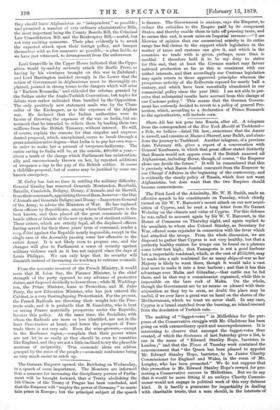The German Emperor opened the Reichstag on Wednesday, in a
speech of some importance. The Members are informed that a measure for increasing the disciplinary powers of Parlia- ment will be brought forward, that a' Treaty abolishing the 5th.Clause of the 'Away of Prague has been concluded, and that the Emperor will "employ the power of Germany" to mam- tain peace in Europe ; but the principal subject of the speech is finance. The Government is anxious, says the Emperor, to reduce the subsidies to the Empire paid by its component States, and thereby enable them to take offairessing taxes, and to secure this end, it must raise anamperial revenue :—" I am likewise of opinion that our economical, activity in its entire range has full claims to the support which legislation in the matter of taxes and customs can give it, and which in the countries we trade with is given, perhaps, more than is needful. I therefore hold it to be my duty to strive for this end, that at least the German market may favour national production as far as this is consistent with our united interests, and that accordingly our Customs legislation may again return to those approved principles whereon the prosperous activity of the Zollverein reposed for nearly half a. century, and which have been essentially abandoned in our- commercial policy since the year 1865. I am not able to per- ceive that substantial results have accrued from this change of our Customs policy." This means that the German Govern- ment has seriously decided to revert to a policy of general Pro- tection, which, according to a declaration of Prince Bismarck to the agriculturists, will include corn.


































 Previous page
Previous page